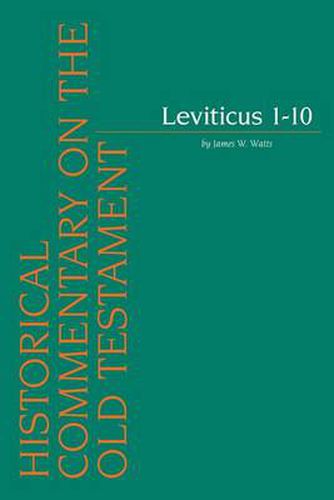Readings Newsletter
Become a Readings Member to make your shopping experience even easier.
Sign in or sign up for free!
You’re not far away from qualifying for FREE standard shipping within Australia
You’ve qualified for FREE standard shipping within Australia
The cart is loading…






James Watts uses rhetorical analysis for this detailed exposition of
Leviticus 1-10. In dialogue with a wide variety of contemporary
scholarship on Leviticus, this commentary also engages the history of
the book’s interpretation and the history of Jewish and Christian ritual
practices. Leviticus’s rhetoric aimed to persuade ancient Israelites to
make offerings to God. It legitimized the monopoly of Aaronide priests
over Israel’s offerings and over determining correct ritual practice.
The priests in turn established the Torah containing Leviticus as the
authoritative text of Israel’s religion. Rhetorical analysis of
Leviticus thus leads to new insights into the role of priests in raising
the Pentateuch to the status of scripture and in shaping the biblical
canon. It also calls attention to the role of ritual rhetoric in the
polities of later Jewish and Christian groups, despite the fact that
neither religion makes animal offerings as Leviticus 1-10 mandates.
$9.00 standard shipping within Australia
FREE standard shipping within Australia for orders over $100.00
Express & International shipping calculated at checkout
Stock availability can be subject to change without notice. We recommend calling the shop or contacting our online team to check availability of low stock items. Please see our Shopping Online page for more details.
James Watts uses rhetorical analysis for this detailed exposition of
Leviticus 1-10. In dialogue with a wide variety of contemporary
scholarship on Leviticus, this commentary also engages the history of
the book’s interpretation and the history of Jewish and Christian ritual
practices. Leviticus’s rhetoric aimed to persuade ancient Israelites to
make offerings to God. It legitimized the monopoly of Aaronide priests
over Israel’s offerings and over determining correct ritual practice.
The priests in turn established the Torah containing Leviticus as the
authoritative text of Israel’s religion. Rhetorical analysis of
Leviticus thus leads to new insights into the role of priests in raising
the Pentateuch to the status of scripture and in shaping the biblical
canon. It also calls attention to the role of ritual rhetoric in the
polities of later Jewish and Christian groups, despite the fact that
neither religion makes animal offerings as Leviticus 1-10 mandates.